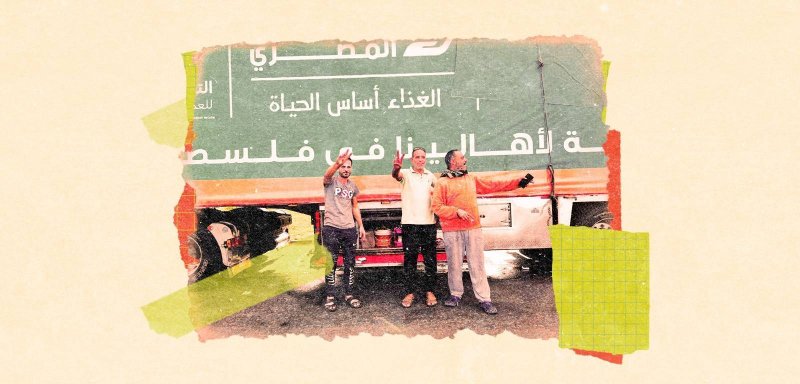On Tuesday November 22, Palestinian resistance factions, led by Hamas, announced a temporary ceasefire agreement with the Israeli government. The four-day ceasefire, which was set to begin on Thursday afternoon but has since been postponed to Friday morning, according to reports from the Israeli Prime Minister's office, has several stipulations. Among them is ensuring the entry of fuel during the temporary ceasefire period, and increasing the number of trucks carrying food, medical supplies, and other essentials across the Rafah Crossing to 300 trucks per day. Will Israel obstruct the flow of this aid?
Days before the agreement of a temporary ceasefire and an increase to the flow of aid, and amid complaints about shortages of basic needs from those in Gaza, Raseef22 headed to the Rafah Crossing. Through conversations with drivers and relief volunteers permitted to cross between the two sides, our goal was to identify the obstructions preventing the flow of the much-needed aid to the people of Gaza.
The four-day ceasefire is set to ensure the entry of fuel and increase the number of trucks carrying food, medical supplies, and other essentials across the Rafah Crossing to 300 trucks per day. But will Israel obstruct the flow of this aid?
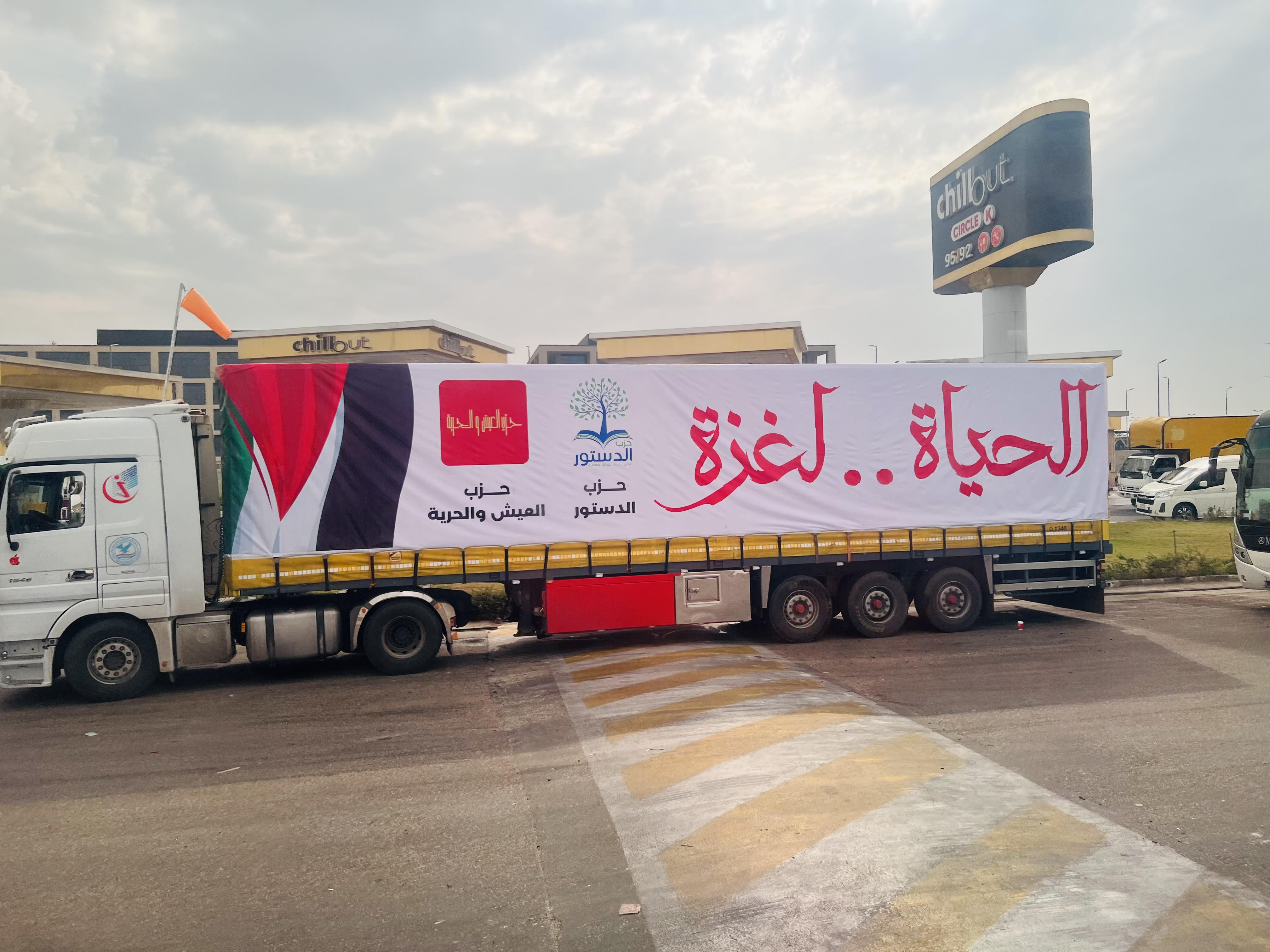 Egyptian aid convoys at the Rafah Border Crossing headed for the Gaza Strip - Photography by Ayat Al-Habbal
Egyptian aid convoys at the Rafah Border Crossing headed for the Gaza Strip - Photography by Ayat Al-Habbal
At the crossing
At the crossing, the first thing you notice is the heavy security presence, buses and trucks of various sizes, and the movement of travelers crossing into Egypt from Gaza Strip, some hold foreign passports and others are previously-stranded Egyptians. There are also representatives from relief organizations managing the entry of these trucks and responding to Israel’s constantly evolving specifications on incoming vehicles and their cargo. The authorized drivers ferrying aid from Sinai to Gaza emerge as the most crucial link, connecting Egypt and Palestine.
Despite the seeming order at the scene, it is impossible to ignore the battle that rages across the border.
Raseef22 accompanied a relief convoy organized by Egyptian civil associations and NGOs, from Sinai headed for Gaza through the Rafah Border Crossing
Since its establishment, and in accordance with the Crossing Agreement, the Rafah border crossing is designated for the crossing of Palestinian ID holders and others, in exceptional circumstances. The process requires an approval from Israeli authorities 48 hours before the crossing date. Israeli authorities have the right to object to a request, and typically does this within 24 hours of an application being submitted.
However, since the beginning of the Swords of Iron war (as Israel refers to it) following Operation Al-Aqsa Storm on October 7th, the Rafah Crossing has been used for the transit of aid from Egypt into Gaza. The Crossing is critical, considering the Israeli blockade that has led to its famine, dehydration, and a lack of medicine and treatment in Gaza.
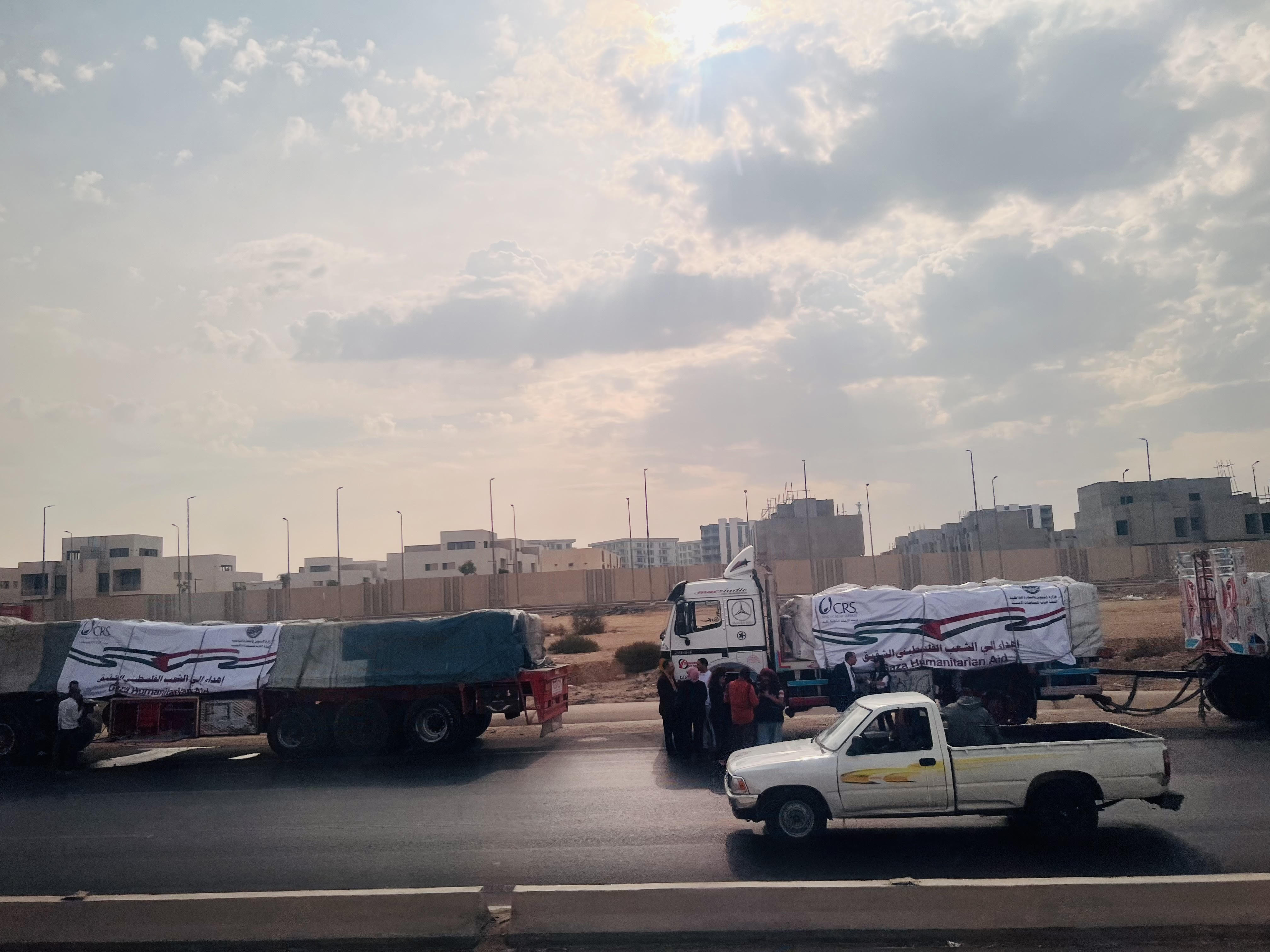 Egyptian aid convoys at the Rafah Border Crossing headed for the Gaza Strip - Photography by Ayat Al-Habbal
Egyptian aid convoys at the Rafah Border Crossing headed for the Gaza Strip - Photography by Ayat Al-Habbal
The Rafah Border Crossing was originally designated for individual crossings, not for trucks. Since the start of the war, it has become critical for the transit of aid from Egypt into Gaza. This is critical considering the famine and lack of medicine in Gaza.
An unexpected situation
Raseef22 accompanied a relief convoy organized by Egyptian civil society organizations headed to Rafah. Such convoys consist of organization employees and volunteers who oversee the delivery of aid from various Egyptian governorates to the Rafah Crossing. At the Crossing, the convoys distribute the aid to the Egyptian Red Crescent, which in turn, delivers it to its Palestinian counterpart.
The trucks carry relief materials, as well as food, water, and blankets for the drivers on their journeys, which, due to Israeli restrictions, have become lengthy.
At the Crossing, Egyptian drivers from across the country either seek work or voluntarily participate in aiding the people of Gaza by contributing to the delivery of essential supplies. These drivers find themselves in an unexpected situation, as they are now forced to interact with Israeli army personnel.
Alaa Saleh, a driver from Damietta, Egypt, works with his brother driving heavy trucks. This marks his first journey across the Border to deliver aid to the people of Gaza. His brother spent two weeks waiting for permission to cross into Gaza. Saleh’s truck is one of hundreds at Rafah waiting to make the crossing. Raseef22 confirms that relief trucks are lined up for several kilometers, waiting for access to the Crossing.
At the Crossing, Egyptian drivers from across the country either seek work or voluntarily participate in aiding the people of Gaza by contributing to the delivery of essential supplies. One such driver waited two weeks before being able to cross into Gaza.
Saleh is not bothered by the wait – only by the subsequent delay of food, water and blankets to people in Gaza. He tells Raseef22, “We are happy to be with our brothers in Gaza, and the long journey getting here is not a problem. The important thing is to stand by them.” On a phone call with his brother, Saleh is told that inspection procedures at the Al-Awja crossing are extremely strict.
Egyptian trucks do not have direct access to Gaza from Rafah. Upon entering Palestinian territories, trucks must head to the Al-Awja/Nitzana Crossing which is controlled by Israeli authorities. Here, trucks are inspected by the Israeli army before they can reach the Palestinian Red Crescent. “The inspection itself does not bother us, what bothers us is that the Israelis are the ones inspecting and searching us,” says one driver.
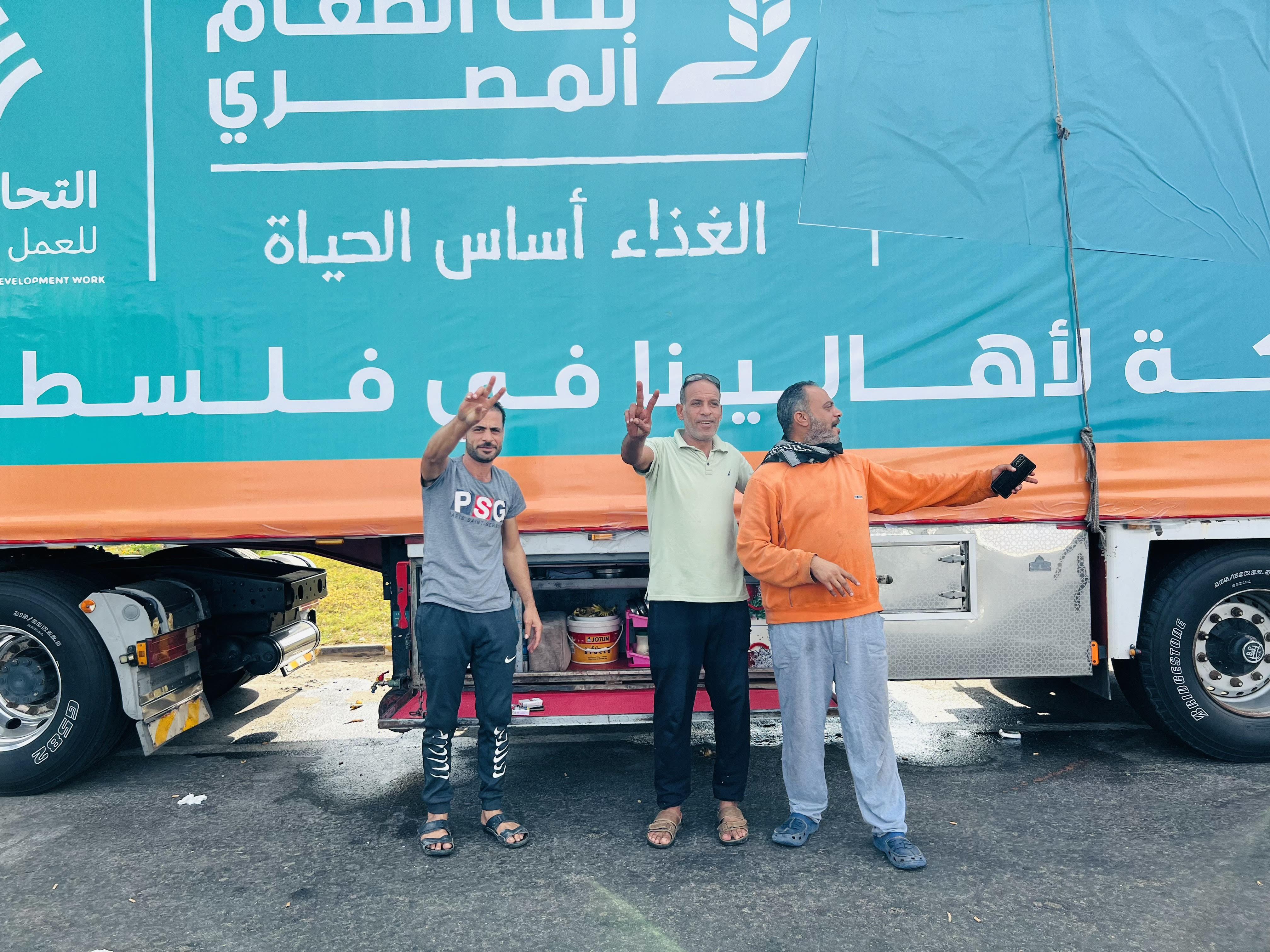 Drivers and relief volunteers at the Rafah Border Crossing headed for Gaza - Photography by Ayat Al Habbal
Drivers and relief volunteers at the Rafah Border Crossing headed for Gaza - Photography by Ayat Al Habbal
Mohammed Ibrahim, also a driver from Damietta, shares the same sentiments. He has been transporting cargo across the Arab world for ten years. Ibrahim came to Rafah from Sudan, where he transported goods from Damietta to Atbara, in northern Sudan. He quickly returned to join the relief efforts for Palestinians in Gaza.
Ibrahim tells Raseef22 that he prepared enough food, drink, and blankets to last him a month, if necessary, in order to ensure the aid he is carrying reaches Gaza. In his truck, he carries “all kinds of preserved and dried foods.” The horrors he witnessed on his TV is what motivated him to take this journey. “This trip is not just a job for me; I want to do something for the people in Gaza.”
Israeli harassment
Ashraf Abdel Ma’boud also came from Damietta to transport relief materials into Gaza. Since the start of the war, he has crossed into Gaza once. “On the first trip, I waited for 20 days after the war started. Although we were here hearing the sounds of bombings day and night, I could not imagine the magnitude of Israel's destruction. When I entered Gaza and saw for myself, I could not believe my eyes.”
Abdel Ma’boud spoke of his journey inside the occupied Palestinian territories. He told Raseef22 that immediately after passing the Rafah crossing, all trucks must head to the Al-Awja crossing for inspection. Here, Israeli forces “unload all vehicles of fuel, metals, tools that could be used for maintenance, and even eating utensils. Then they conduct a search and inspection with a radiation device, and if anything suspicious arises, the entirety of the truck is unloaded for thorough inspection then loaded again.”
After completing the inspection, the trucks are met by Palestinian Red Crescent workers who collect the cargo for Gaza's residents.
According to the testimonies of drivers and relief volunteers who crossed to the other side, the Israeli side is finding "increasingly creative ways" to hinder trucks from passing, amid fears that the same practices will continue even with the start of the ceasefire
According to the testimonies of several drivers and volunteers who have crossed into Gaza, Israel is finding “increasingly creative ways” to hinder trucks from passing. The measures obtained by Raseef22 details that crates must be packed in a specific way, not in excess of outlined quantities. “If the load is higher than half the height of the truck’s cargo area, they will reject it.” Their inspections are purposely slow, and halted altogether after 5pm. Drivers are prohibited from returning to Rafah from Gaza. There are concerns that these Israeli practices will persist despite the temporary ceasefire, causing disruptions and delays in aid.
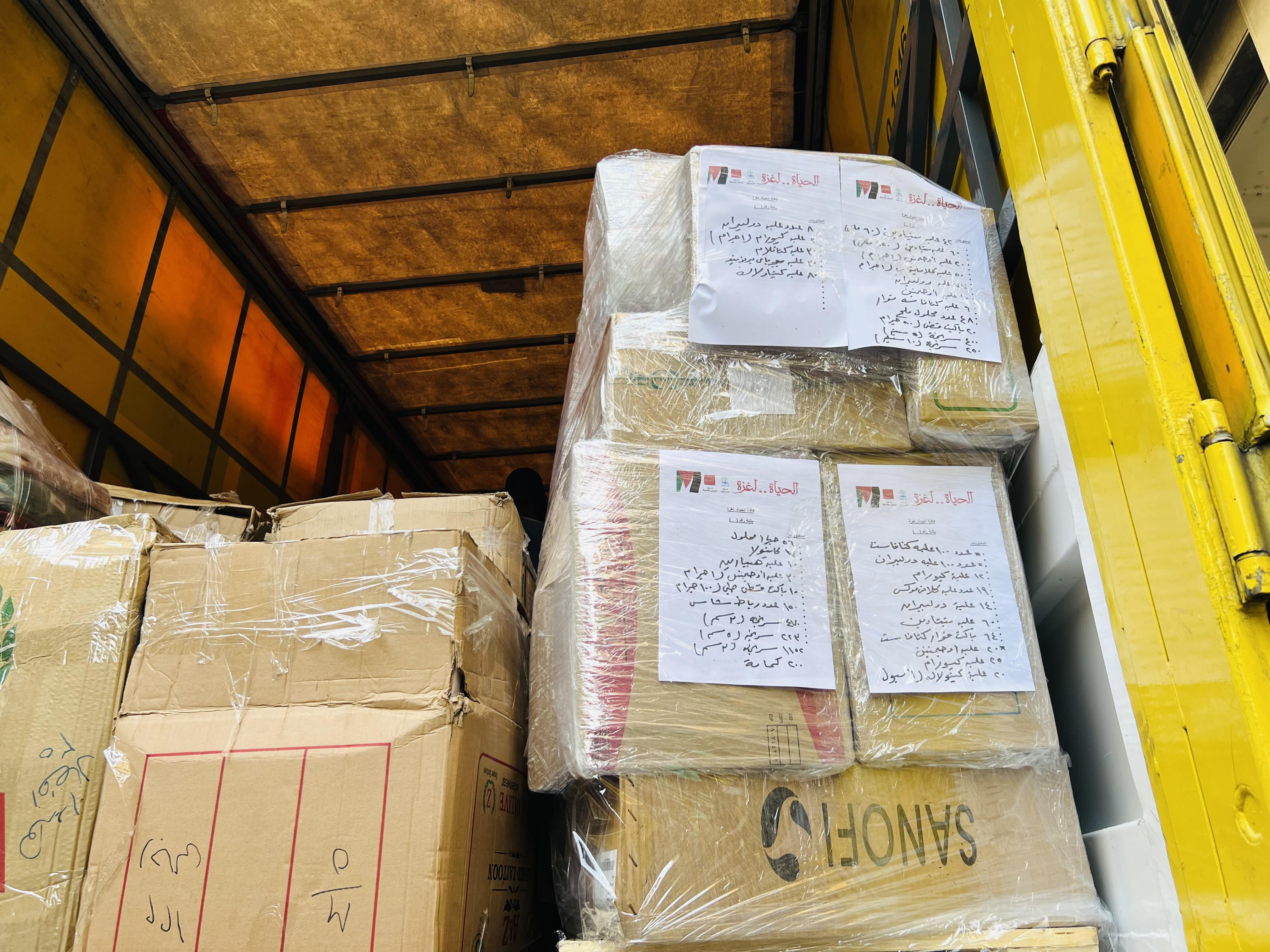 Egyptian aid convoys at the Rafah Border Crossing headed for the Gaza Strip - Photography by Ayat Al-Habbal
Egyptian aid convoys at the Rafah Border Crossing headed for the Gaza Strip - Photography by Ayat Al-Habbal
Ashraf Abdel Ma’boud explains that all drivers making the journey have official permits from the relevant authorities, and their vehicles have already undergone inspection either by civil society organizations or at the Tahya Misr Tunnel crossing. While he understands those procedures, he does not appreciate the extreme discomfort from the Israeli inspections. “We, as Egyptians, dislike Israelis, so the inspection process is a burden. But our goal is to ensure that the aid reaches its destination.”
According to Abdel Ma’boud and a number of his colleagues, Israeli soldiers have a clear goal: “to cut off assistance to the Palestinians in order to intensify the blockade on them."
This marks the second time Abdel Ma’boud transport food across the border, and he emphasized that civil society organizations are keen on ensuring a certain standard of food transported to Gaza.
Raseef22 noticed large Egyptian Red Crescent aid trucks heading towards Palestine. Their drivers confirmed that while some crossed in the morning and returned at night, others were still awaiting inspection.
Egyptian Red Crescent cars wait for trucks to return from Al-Awja to Rafah after Israeli inspection. The trucks are then handed over to the Palestinian Red Crescent. In addition to supporting trapped foreign nationals, the Egyptian Red Crescent also welcomes ambulances from Gaza carrying wounded civilians on route to receiving treatment at Egyptian hospitals.
The Rafah Crossing is the only of six crossings into Gaza that Israel does not control. However, the crossing has been closed several times. In 2006, Israel declared its partial closure. In 2007, after factional fighting, Israel announced its complete closure. Though it has been open and operational since the January 25 Revolution in 2011, it has been subject to security considerations from both Egypt and Israel.
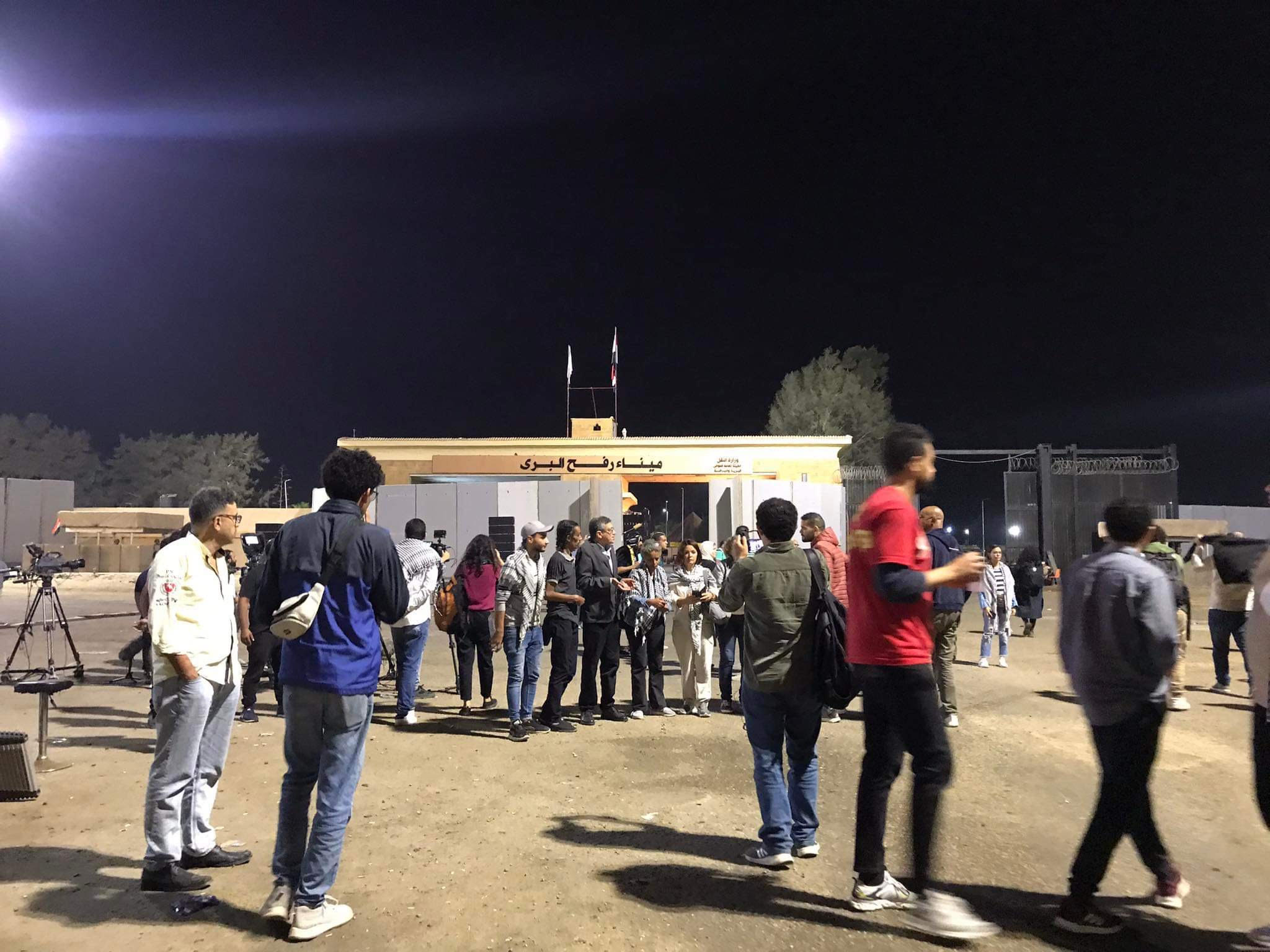 Drivers, relief volunteers, and members of the Red Crescent at the Rafah Border Crossing - Photography by Ayat Al Habbal
Drivers, relief volunteers, and members of the Red Crescent at the Rafah Border Crossing - Photography by Ayat Al Habbal
Sleeping at the Crossing
Hassan El Sayed*, a driver at the Egyptian Rafah Crossing, traveled from Fayoum to deliver aid to Gaza. At times, he finds himself preparing to spend the night at the Crossing, as he awaits inspection procedures or for his colleagues to return to Egypt. El Sayed tells us, “The sound of shelling is very close, it is as if we are in a battle. The noise intensifies while we are inside the Crossing. This is the first time I have felt this scared, and every time I hear shelling, I feel like I am hearing the voices of the victims and the deaths in Gaza, leaving me unable to sleep.”
Although El Sayed has crossed into Palestine to deliver aid numerous times, this marks the first time he feels anxious doing so. He notes that Egyptian authorities ensure the process of aid entry and the safety of those delivering it. El Sayed views his contribution as a duty and "the least anyone can do to support the Palestinians."
Ahmed El Omda, a heavy truck driver from Fayoum, Egypt, headed straight to the Crossing after the war broke out. He was prompt in obtaining the required permits to deliver aid. He tells Raseef22, “I came with my brothers and cousins to transport aid, and we are spending every night at the crossing.”
According to El Omda, Egyptian authorities work to ensure the efficient flow of aid into Gaza. “The only hindrance,” El Omda laments, “comes from the Israelis.”
He reiterates that all gas and additional fuel containers inside the trucks are unloaded before entering the Al-Awja Crossing, following the instruction sheet provided to each driver. These instructions mandate emptying the vehicle of fuel, metal equipment, metal food utensils, knives, or weapons. "All drivers adhere to these conditions to ensure the aid delivery."
Another driver, who preferred to remain anonymous, told Raseef22 that Palestinian Red Crescent workers bear the physical and psychological toll of the war. Despite the extreme conditions, these workers are resilient and patient. Their problems range from the small –one such worker was even struggling to obtain a loaf of bread, to more grave matters.
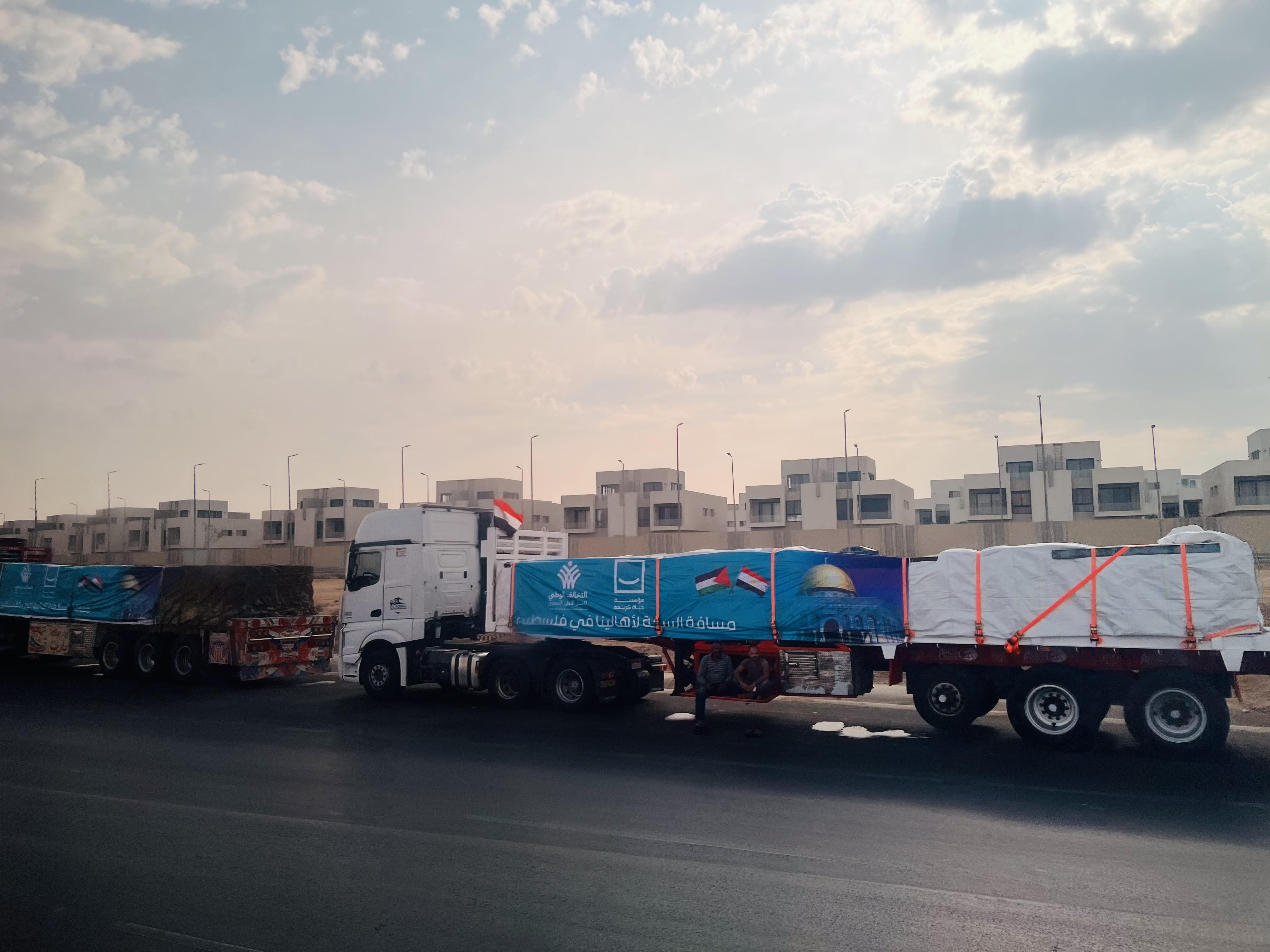 Egyptian aid convoys at the Rafah Border Crossing headed for the Gaza Strip - Photography by Ayat Al-Habbal
Egyptian aid convoys at the Rafah Border Crossing headed for the Gaza Strip - Photography by Ayat Al-Habbal
Since the start of the war, volunteers from international and local relief organizations, especially the Egyptian Red Crescent, have maintained a presence at the Crossing. Raseef22 met with one such volunteer. He explained that once a vehicle passes through the Egyptian Rafah Crossing, in the morning, it makes its way to the Al-Awja Crossing.
Vehicles arrive at the Egyptian border at 9pm, in order to depart for the Al-Awja Crossing, 45 km away, at 6am. He confirms that the Rafah border crossing between Egypt and Gaza remains open, and dozens of trucks pass through it daily. “The cars are loaded with all the necessary humanitarian, medical, and food aid to relieve the people of Gaza. Egypt has received hundreds of tons of aid from various countries. They all await entry."
The volunteer points out that all aid trucks are accompanied by an Egyptian Red Crescent vehicle. Trucks are also escorted vehicles by Egyptian security authorities. The Egyptian Red Crescent vehicles lead the aid trucks from Rafah to a designated point further along the Egypt-Gaza border. At this point, the trucks travel independently, as they make the hour-long journey to the Al-Awja Crossing for further inspection.
Israeli forces sometimes only inspect 10 of the 120 trucks crossing from Egypt daily. After sunset, inspections cease completely. “Israel obstructs the aid process by reducing the number of vehicles inspected daily.”
Once aid into Gaza was permitted, only 20 trucks per day were allowed to make the crossing. This number has increased to 120 vehicles per day. “This is significant, considering that the Rafah Border Crossing was originally designated for individual crossings, not for trucks. In the last month, it has been repurposed to transport aid into Gaza.”
While aid trucks face Israeli inspection at the Al-Awja Crossing, Red Crescent volunteers wait at the border strip (the neutral land between the Egyptian, Israeli, and Palestinian borders). They are responsible for ensuring aid reaches the Palestinian side of the border. Once through inspection, the Palestinian Red Crescent and UNRWA unload the trucks, transferring their cargo into Palestinian vehicles to bring them to Gaza. The transfer of aid from the Egyptian to the Palestinian Red Crescent is confirmed by a signed formal handover.
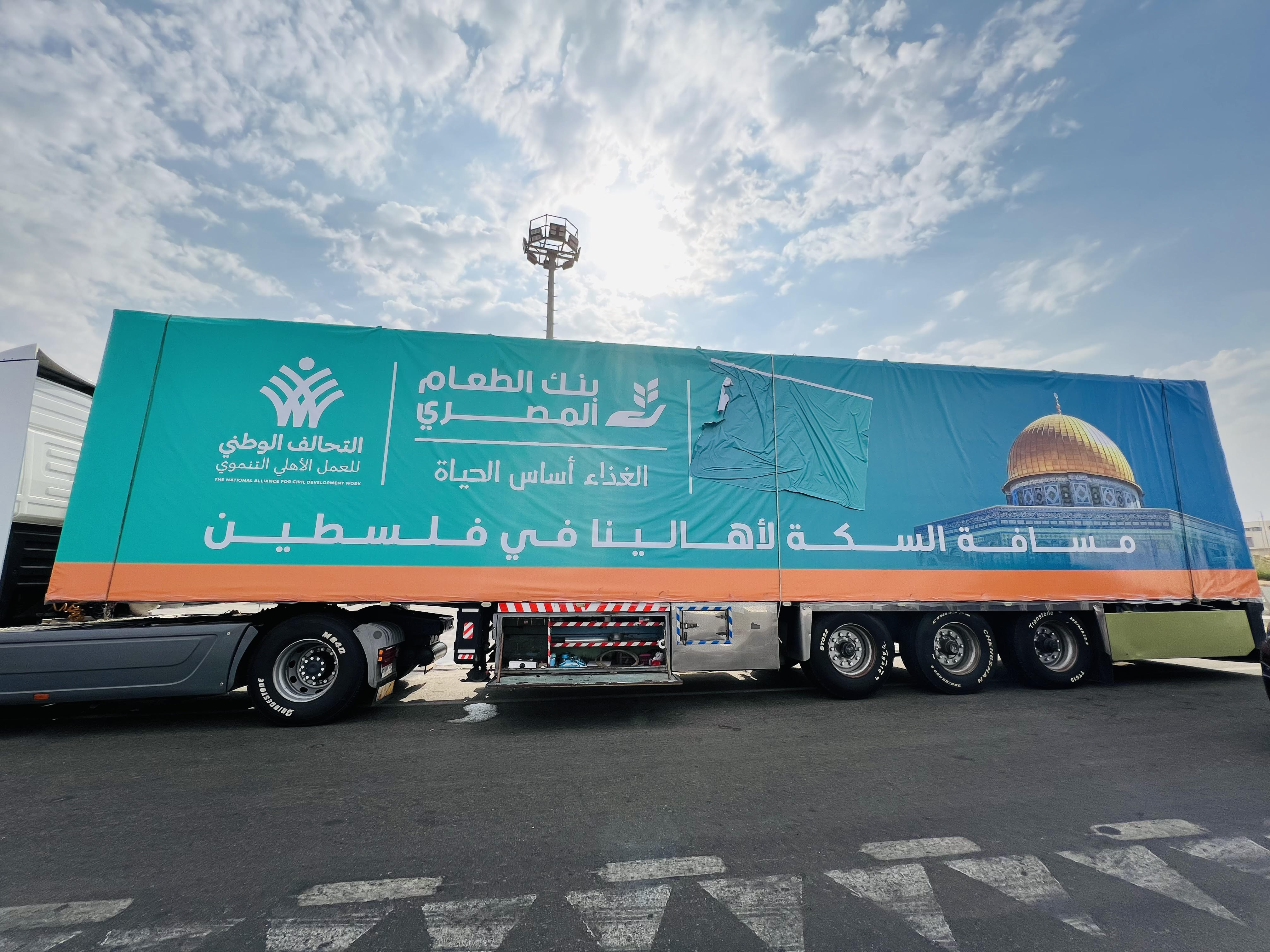 Egyptian aid convoys at the Rafah Border Crossing headed for the Gaza Strip - Photography by Ayat Al-Habbal
Egyptian aid convoys at the Rafah Border Crossing headed for the Gaza Strip - Photography by Ayat Al-Habbal
According to an Egyptian Red Crescent source we spoke with, Israeli forces sometimes only inspect 10 of the approximately 120 trucks crossing from Egypt daily. After sunset, inspections cease completely. “They [Israel] obstruct the aid process by reducing the number of vehicles inspected daily. The trucks are congested not only on the Egyptian side but also experience significant congestion at the Al-Awja Crossing.”
According to statements obtained by Raseef22, UNRWA stated that it does not have sufficient fuel to move vehicles to the Rafah Crossing to receive incoming aid. It called for an increase to incoming fuel, which is currently limited to one truck per day.
Ambassador Ahmed Abu Zeid, spokesperson for the Ministry of Foreign Affairs, stated that the Rafah Crossing is open and has not been closed at any stage since the beginning of the crisis in the Gaza Strip. He pointed out that the Israeli side impedes the entry of aid into the Gaza Strip through obstructive procedures and unwarranted and flimsy justifications.
Abu Zeid revealed that there has been a “noticeable increase in strictness” of Israeli inspection procedures. Many aid trucks have been refused entry altogether.
Raseef22 is a not for profit entity. Our focus is on quality journalism. Every contribution to the NasRaseef membership goes directly towards journalism production. We stand independent, not accepting corporate sponsorships, sponsored content or political funding.
Support our mission to keep Raseef22 available to all readers by clicking here!
Interested in writing with us? Check our pitch process here!
